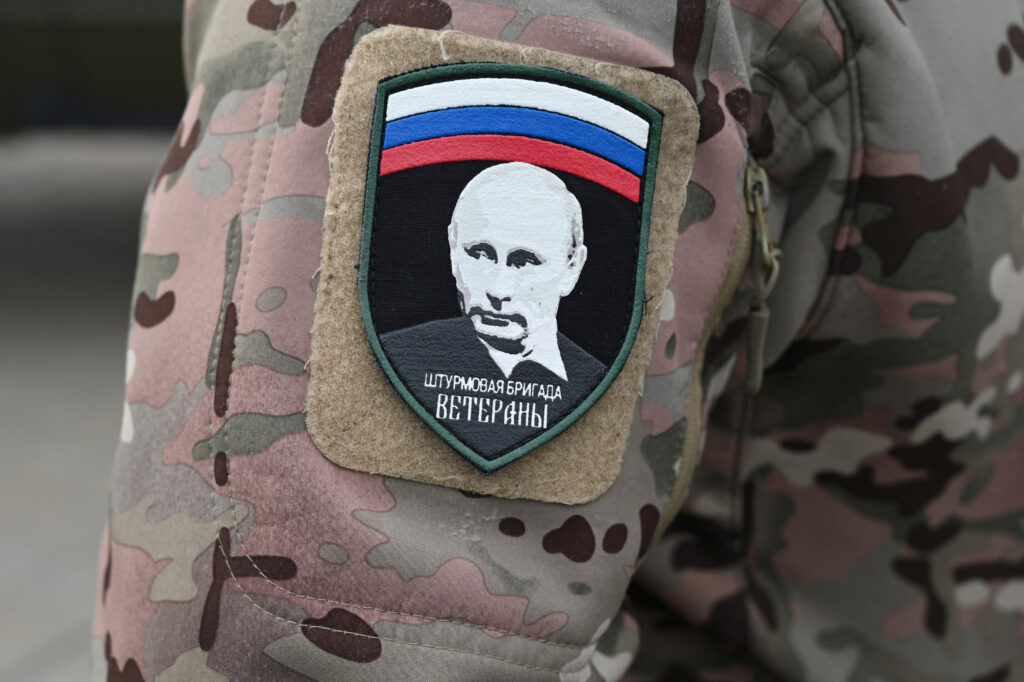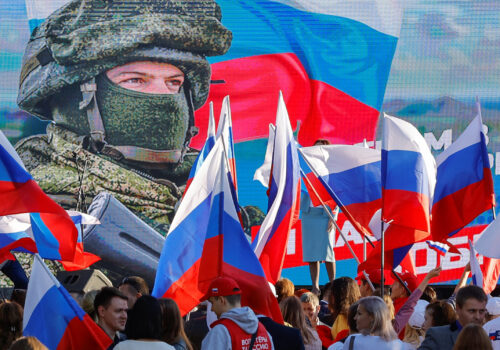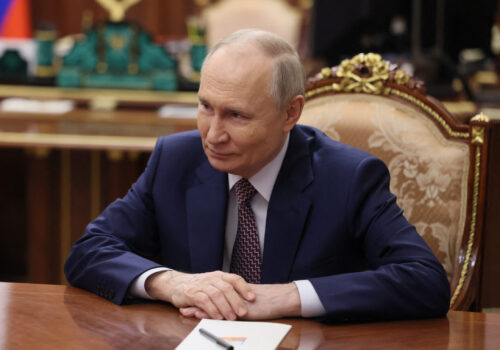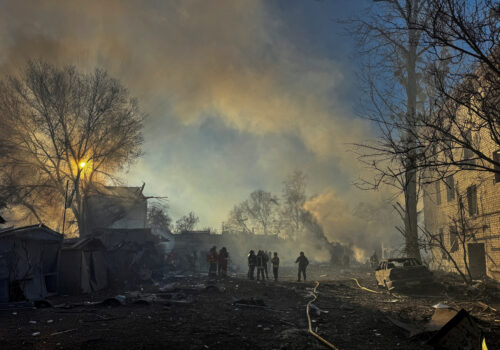US President Donald Trump’s March 18 phone call with Russian President Vladimir Putin marked the start of a new phase in the efforts to end Russia’s war against Ukraine. For his part, Trump appears intent on reaching a deal through compromise and expediency that establishes a cessation to the fighting. By all outward appearances, however, his counterpart in the Kremlin does not.
Misreading Putin’s aims at this pivotal moment carries risks that could cost the United States in the long term and create a new security crisis in Europe. For the United States, one risk is that the Russian president may, after wringing steep concessions from negotiations, agree to a deal that he has no intention of upholding. Time and again, history has warned against equating concession to Russian demands with a step toward lasting peace. Peace with Russia will require more than just a handshake.
Perhaps the most important starting point for Trump’s negotiations is recognizing this: Russia’s unprovoked war of aggression against Ukraine has never been simply about where to draw borders. Moscow’s aggression is motivated more by ideology and regime security than a desire to acquire a bit more land. Going forward, US negotiations must understand this larger picture of what motivates Russia, as it is critical for constructing a durable and lasting peace.
Putin’s ‘Russian world’
For years, the Kremlin has promoted the idea of a “Russian World,” whose “borders do not end anywhere.” It is this ideology that informs Russia’s desire to swallow Ukraine whole and menace Europe. The idea of Ukraine joining the prosperous, democratic club of nations threatens the grip of the Russian government’s imperial, kleptocratic despotism. Today, Russia is a mafia-like state in large part held together by cruelty and fueled by a reservoir of lies and corruption. In many disturbing ways, Russia’s conduct in its war against Ukraine emulates the way its leaders have behaved within their own territory. Russia has abducted thousands of Ukrainian children, killed scores of noncombatants, and adopted military tactics that show little regard for the lives of its own soldiers.
Russia has justified its aggression by touting the supposed “historical unity” of Slavic nations. Putin’s motivation for rule-breaking seems to stem from a desire to return to a more brutish past, when violent spheres of influence, rather than international norms and laws, dictated the terms of occupation for millions of people in Ukraine, Georgia, Moldova, Belarus, and the Baltic states.
In Russia, foreign policy is often a “tool” of domestic policy, as these civilizational claims better justify Putin’s internal repression at home. For the Russian president, his country’s capacity to menace Europe assists his goal of shaping the Russian populace. Conformity, repression, and nationalism for Russia at home is just as critical to cementing Putin’s power as events unfolding outside Russia’s borders. Putin must continually demonstrate to his own population that Ukraine’s democratic aspirations are hopeless. Otherwise, he seems to fear uprisings of a similar caliber to those in Georgia in 2024, Belarus in 2020, or Ukraine in 2014, which could threaten his kleptocratic grip on power.
Lessons from the Minsk agreements
Throughout the negotiation process, Russia’s war aims are unlikely to change. Putin wants to ensure Ukraine is ungovernable and weak, preventing it from fully integrating with the West and becoming a symbol of self-determination on Russia’s doorstep. Neither latent Russian imperialism nor the Kremlin’s fear of “color revolutions” will go away if the United States chooses to appease Russia.
Stark warnings from top US diplomats and former Russian officials alike emphasize that dealmaking with Putin will be extraordinarily challenging and fraught with the risk of deception. In 2019, Ukrainian President Volodymyr Zelenskyy was elected largely on the issue of ending the war with Russia in the Donbas and resisting the slide back into the vortex of Moscow’s dystopian melodrama. The region was still simmering from Russia’s unprovoked attacks in the Donbas and Crimea in 2014, after the Ukrainian people ousted its Russia-friendly president, Viktor Yanukovych, and attempted to look toward Europe.
The 2019 agreements between Russia and Ukraine, which Zelenskyy pursued, failed because they tried to paper over an irreconcilable clash of interests. Russia is on a quest for permanent imperial control of Ukraine, and Ukraine wants to be a democratic sovereign state. As a result, Russia repeatedly broke cease-fire agreements it had signed, and there is no indication, short of credible deterrence, that Russia will honor future agreements.
As Russia’s political levers of control over Ukraine diminished in the years following Yanukovych’s ouster, the Kremlin was emboldened to use larger-scale violence to subdue its neighbor in 2022. Putin’s aims were still to ensure that the secure, sovereign, peaceful, rules-based, democratic, European way of life couldn’t infect his “Russian World.”
In both the Minsk agreements and the lead-up to the full-scale February 2022 invasion, Russian officials never discussed the parameters of arms control or the security of Russia’s pre-existing borders, according to reports. This suggests that they were never really interested in nonviolent remediation measures for their so-called “security concerns.”
Ukraine cannot end Russian aggression by signing a treaty that creates a new border demarcation line. Instead, Ukraine and its partners must reestablish credible deterrence through security guarantees that prevent destabilizing Russian aggression. In preparing for a cessation of hostilities, the United States, as Ukraine’s military partner, should prioritize engaging Ukraine and Europe, rather than focusing on appeasing a lawless, reckless Russian Federation.
Ukrainians, alongside their Eastern European neighbors, warn that Russia’s motives for launching its invasion indicate wider imperial ambitions beyond Ukraine. Ignoring this perspective risks European security, US interests, and global stability. Only security guarantees—or as Lithuanian Defense Minister Dovilė Šakalienė recently put it, only negotiations with a “gun on the table”—will give Russia pause.
Zak Schneider is a young global professional with the Atlantic Council’s Transatlantic Security Initiative within the Scowcroft Center for Strategy and Security.
Further reading
Thu, Mar 20, 2025
Putin is ruthlessly erasing Ukrainian identity in Russian-occupied Ukraine
UkraineAlert By Peter Dickinson
Kremlin dictator Vladimir Putin is pursuing policies in Russian-occupied Ukraine that almost certainly meet the definition of ethnic cleansing and may qualify as genocide, writes Peter Dickinson.
Thu, Mar 20, 2025
Trump’s energy sector ceasefire could be good news for Putin’s war machine
UkraineAlert By
Russian dictator Vladimir Putin has backed US President Donald Trump's proposal for a partial ceasefire on energy sector attacks, but this may be a strategic step rather than an indication of his readiness to end the invasion of Ukraine, writes David Kirichenko.
Fri, Mar 7, 2025
Former US Senator Rob Portman: How to achieve a successful cease-fire and lasting peace in Ukraine
New Atlanticist By
“We should all want the war on Ukraine to end, and we should welcome negotiations. But we should negotiate from a position of strength,” writes a former US senator.
Image: A Russian service member wears a patch depicting Russian President Vladimir Putin during a ceremony to receive new vehicles and military equipment handed over by the Russian movement "People's Front" for the military involved in Russia-Ukraine conflict, in Rostov-on-Don, Russia February 23, 2025. The patch reads: "Veterans assault brigade." REUTERS/Stringer



